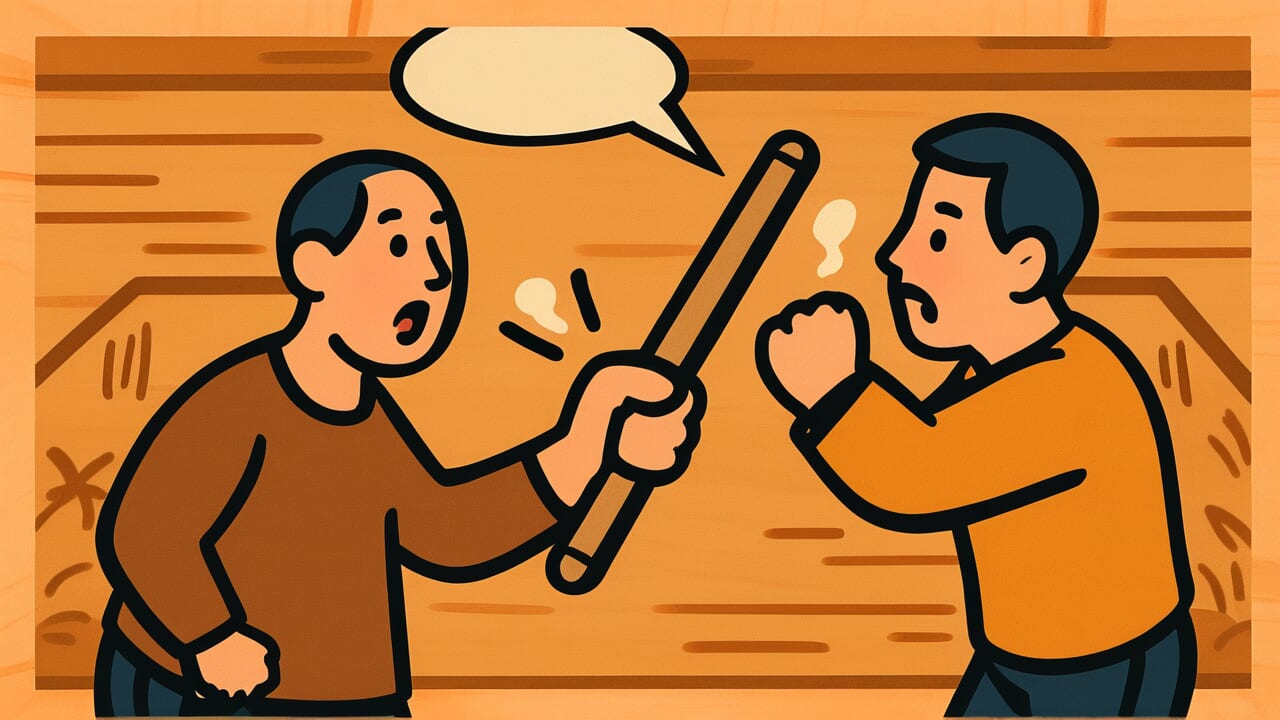How to Read “Cutting the milk stick after the fight is over”
けんかすぎてのぼうちぎり
Meaning of “Cutting the milk stick after the fight is over”
“Cutting the milk stick after the fight is over” means preparing weapons after a conflict has ended is pointless. In other words, it teaches us that preparing after the necessary moment has passed is already too late.
This proverb emphasizes the importance of advance preparation and readiness. It’s used when pointing out actions with poor timing, like someone who starts studying after an exam ends or someone who begins gathering materials after a deadline has passed.
The reason for using this expression is that it emphasizes the absurdity and meaninglessness of being unprepared more effectively than simply saying “too late.” The contrast between the tense scene of a fight and the leisurely image of cutting branches highlights how out of sync the action is.
Even today, many people act only after missing their opportunity. This proverb continues to hold value as a reminder that warns against reactive responses and reminds us of the importance of forward-thinking preparation.
Origin and Etymology
While no clear written records of this proverb’s origin seem to exist, we can make interesting observations from the components of the phrase.
The key lies in the term “bōchigiri.” “Chigiri” is an old word meaning to cut off tree branches. Therefore, “bōchigiri” is thought to represent the act of cutting off tree branches to prepare a staff for use in fights or battles.
In Japan before the Edo period, common people sometimes broke off nearby tree branches to use as makeshift weapons during conflicts. However, frantically cutting branches to make a staff after the fight ended was obviously too late. The prevailing theory is that this comical scene became established as a proverb warning against delayed preparation.
Similar expressions include “ato no matsuri” (after the festival) and “dorobō wo mite nawa wo nau” (twisting rope after seeing the thief). However, “Cutting the milk stick after the fight is over” specifically emphasizes unpreparedness in the tense situation of conflict. Even the sound of the phrase conveys a sense of frantic panic.
This is a proverb born from the lives of common people, filled with genuine feeling.
Usage Examples
- Perfecting your materials after the presentation is over is like cutting the milk stick after the fight is over
- Buying disaster supplies after the typhoon has passed is truly cutting the milk stick after the fight is over
Universal Wisdom
The reason “Cutting the milk stick after the fight is over” has been passed down through generations is that it brilliantly captures a fundamental human weakness.
Everyone becomes serious only when crisis looms right before them. In peaceful daily life, we postpone things with “I’ll do it someday” or “It’s still okay.” This isn’t laziness but rather because the human brain is designed to prioritize immediate comfort. Our instinct chooses present ease over distant future crises.
However, the sight of someone frantically preparing after something has already happened is indeed comical. Imagine someone in the middle of a fight saying, “Wait a minute, I need to make my weapon first.” You can picture the helplessness and absurdity of that scene.
What this proverb teaches is that life has an absolute element called “timing.” No matter how excellent your preparation, it loses value if you miss the moment. Our ancestors repeatedly experienced this harsh truth and tried to pass it on to future generations.
Time cannot be reversed. That’s precisely why preparation in this very moment will save your future self.
When AI Hears This
When you view emotional conflicts like fights through control theory, they match engineering system failures with surprising accuracy. Imagine air conditioner temperature control. When you set it to 25 degrees, an unsophisticated control system overcools to 22 degrees, then overheats to 28 degrees, repeating oscillations. This is overshoot.
The same thing happens in fights. The moment someone’s words irritate you, your brain reacts with “Let’s return this discomfort to zero.” However, the emotion of anger is a system with abnormally high control gain, meaning reactions easily become excessive. Your retort becomes unnecessarily harsh, overshooting the goal of “equal standing” into territory that hurts the other person. The other person overreacts similarly, and the entire system enters a divergent state.
In control theory, there’s a concept called damping to prevent such oscillations. It’s a design that approaches the target gradually, not with sudden braking. Cutting the milk stick after a fight is the destructive terminal state after the system has completely diverged. In engineering, this would be a design flaw, but the human brain carries this bug because “instant overreaction was advantageous for survival” during evolution, and we’ve been thrown into modern society with it intact. The control system called emotion has a fatal flaw: no built-in time delay.
Lessons for Today
What this proverb teaches modern you is that “today’s small preparation becomes tomorrow’s great peace of mind.”
In our busy daily lives, we tend to get caught up only in what’s right in front of us. But stop and think for a moment. If you use just a little time now to prepare, how much easier will your future self have it?
Specifically: ten minutes of daily study, scheduling an annual health checkup, contacting important people, reading to improve your skills. None of these may be necessary “right now.” But these small actions will protect you when the time comes.
The important thing is not to aim for perfection. Just thinking “I should prepare” without taking action is ultimately the same as doing nothing. Start small with what you can do today.
The future cannot be predicted, but it can be prepared for. Your choices today create tomorrow’s you. Before the fight begins, why not prepare one staff for your heart?



Comments